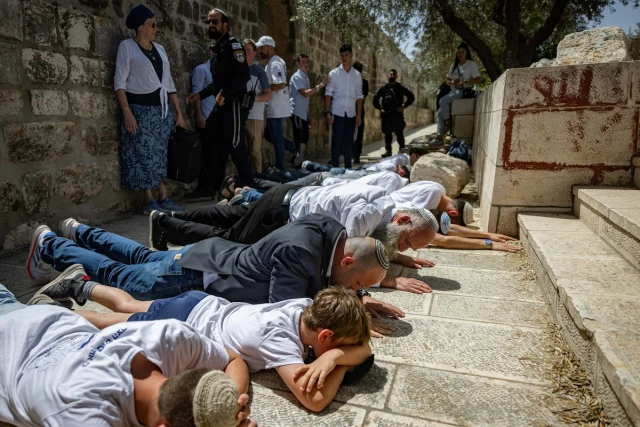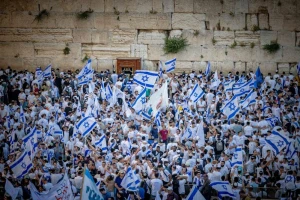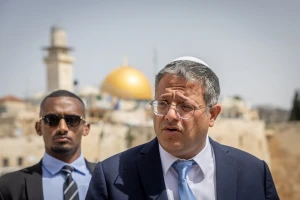National Security Minister Ben Gvir visits Temple Mount on Jerusalem Day, says ‘prayer and prostration are permitted’
Ben Gvir has drawn repeated criticism for his visits to the contested site, considered holy by Jews

After ascending to the Temple Mount on Jerusalem Day, National Security Minister Itamar Ben Gvir said that Jewish prayer, and even bowing down, is allowed at the holy site.
Flanked by members of his Jewish Power party, including Minister of the Negev, Galilee, and National Resilience Yitzhak Wasserlauf and Knesset Member Yitzhak Kreuzer, Ben Gvir said that “many Jews are flooding the Temple Mount.”
“Today, thank God, it is already possible to pray on the Temple Mount, to bow down on the Temple Mount, we thank the Holy One, Blessed is He, for this,” Ben Gvir stated while visiting the site, before saying that he and his companions had come to pray “for the hostages, that all come back safely, and for total victory in the war.”

Ben Gvir also said that he prayed for the success of the new Shin Bet appointee, Maj. Gen. David Zini.
“And I pray for the success of the new head of the Shin Bet: that he will pursue our enemies, that he will mow down our enemies, as he has done throughout his years – to be professional, and to distinguish between an enemy and a friend: those who love are embraced, and enemies are mowed down,” Ben Gvir stated.
Alongside Minister Ben Gvir, Religious Zionism MK Zvi Sukkot also ascended the Temple Mount, posting to social media a video of himself at the site with an Israeli flag.
“The Temple Mount is in our hands. The Temple Mount is in our hands,” Sukkot says in the video, while also mentioning 58 years since the paratroopers took the site during the 1967 war.
Ben Gvir’s visit came as Israel celebrated 58 years since the reunification of Jerusalem following the 1967 Six-Day War, in which the Jewish nation also took control of the territories of Judea and Samaria from the country of Jordan.
Festivities in the city began to take shape already in the morning hours, with thousands of people marching with Israeli flags while singing songs and beating drums. Schools in the city were given early release ahead of the many street closures to make way for the annual Flag March, which coincides with Jerusalem Day.
In the past, there have been tense confrontations between Jewish and Arab residents of the city on the day, and a heavy police presence was also seen at multiple points throughout the city.
Ben Gvir has drawn criticism from both ultra-Orthodox and right-wing Israeli politicians for his visits to the Temple Mount, which often take place on religious or national holidays. His previous visit was during the Passover holiday in early April.
While there is no Israeli law forbidding Jewish prayer on the site, the government of Prime Minister Benjamin Netanyahu has repeatedly upheld the status quo, which has prevented Jewish prayer at the contested site.
However, due to the Israel Police being part of his ministry, Ben Gvir has instructed the police not to detain Jews praying on the Temple Mount.
Many politicians and security officials have warned that such visits are provocative, and could inflame tensions.
The Israeli organization Beyadenu [Hebrew for ‘In our hands’] has said that an increasing number of Jews are ascending the Temple Mount each year.
The Kingdom of Jordan, which administers the site as part of an agreement with Israel, released a statement, saying the “storming of Al-Aqsa Mosque by Ben-Gvir and other government members is a flagrant violation of the historic status quo and Israel's obligations. The Jordanian Foreign Ministry warned of the consequences of these violations.”
“Such incursions do not change the reality that East Jerusalem is occupied territory and that Israel holds no sovereignty over it,” the statement read.

The All Israel News Staff is a team of journalists in Israel.
You might also like to read this:










